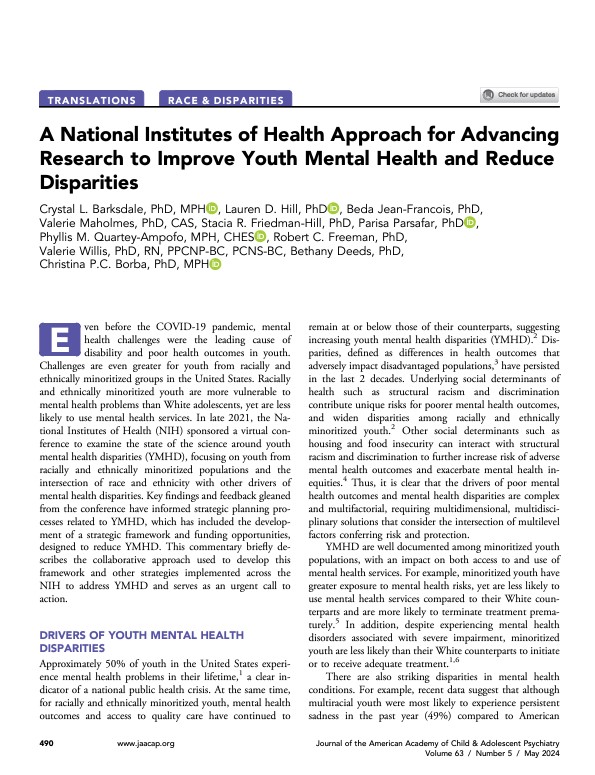Health & Mental Health
Examines the impact of race on age at the onset of school disciplinary actions and police contact, and the rate of receiving increasingly severe disciplinary actions.
This report details the results of the first-ever state-wide Adverse Childhood Experiences (ACEs) survey administered to people currently incarcerated for crimes they committed as children (under eighteen). The trauma measured from ACEs surveys include physical, sexual, and emotional abuse; physical and emotional neglect; separation from parents; mental illness or substance abuse in the home; parent…
Studies consistently confirm that incarcerating young people causes great harm, including increased victimization, recidivism, school drop-out, and long-term physical and mental health issues. Fortunately, research also identifies what young people need for positive, healthy development. Alternatives to incarceration, such as release schedules, should be crafted to ensure each young person has time for and access…
Florida routinely pushes Black children out of schools and into a legal system with well-documented harms. In recent years, the state has made significant investments in school law enforcement and self-proclaimed “tough love” youth legal system policies, purportedly in the name of public safety. However, these investments have yielded a system that disparately disciplines, arrests,…
The evidence provided in this brief supports bold reforms for youth and emerging adults sentenced to extreme punishments.
The answer, then, is not to simply reform the system of punishment, but to stop surveilling and punishing kids and instead invest in the things that set kids up for success, like education, family support, and access to healthcare. We need to start seeing children as children, not as criminals, and giving them the tools…
A robust literature is developing around how the stress of discrimination is implicated in individual- and group-level sleep disturbances, and how these disturbances contribute to the development of population-level sleep disparities over time. Although discrimination can be based on many individual and intersecting biases, like gender, sexuality, socioeconomic status, and education, in this article, we…
This article situates trauma within the Supreme Court’s mitigation framework for adolescents. The framework is based on the developmental research recognized by the Supreme Court in three landmark cases—Roper v. Simmons, Graham v. Florida, and Miller v. Alabama.
The National Youth Justice Network released a report detailing legislative trends on youth rights from 2023. This report highlights key gains made by several states around juvenile court fines and fees, expungement, transfer, and youth interrogation among other issues, and flags several regressive legislative trends rooted in harmful narratives about young people. This overview of…
This one-page infographic illustrates statistics from the Office of Juvenile Justice and Delinquency Prevention’s Juvenile Residential Facility Census
This report describes the process of developing or cultivating purpose and explains why purpose is one of the key aspects of healthy development in adolescence. Cultivating purpose is widely beneficial for adolescents, and it is particularly important for adolescents from traditionally underserved groups. Purpose is essentially a renewable resource that has the potential to benefit…
The focus of this paper is on the experience of Black adolescents who are growing up amidst evolving national beliefs about racism, ongoing political debate surrounding the Black Lives Matter movement, and a growing national awareness about the experience of being Black in America.
In this session of our 2023 Racial Justice Training Series, Prof. Kristin Henning, Director of the Juvenile Justice Clinic and Initiative at Georgetown Law, and Mary Ann Scali, Executive Director of The Gault Center, will be joined by Dr. Linda Caldwell, Emeritus Distinguished Professor in the Dept. of Recreation, Park, and Tourism Management at The…
A webinar from April 10, 2023 with Dr. Martin Irwin, MD, Clinical Professor at the NYU School of Medicine, Department of Child & Adolescent Psychiatry. Multiple studies have concluded that children in the juvenile legal system or foster care, many of whom are victims of abuse and trauma, are prescribed psychiatric medication at a rate…
Webinar provided by the Gault Center on April 25, 2023. This training provided an historical overview on the racialized use of medicine, provider bias, and cultural mistrust, followed by a discussion on practical tools youth defenders can utilize to litigate against medication conditions and/or misdiagnoses of youth in the juvenile legal system. This training built…
On March 24, 2021, NJDC and the Mid-Atlantic Juvenile Defender Center hosted a webinar titled FASD & Youth: What Defenders Need to Know. This video includes information about FASD provided by Dr. Larry Burd. Portions of the webinar addressing defense strategies have been edited out of this public version. Description of the webinar: Approximately five…
The work described herein articulates a way forward for the NIH to continue to improve youth mental health and to reduce YMHD through supporting rigorous, impactful research. However, the urgency of the youth mental health crisis and YMHD is so pressing that many NIH ICOs have already begun this important work, particularly through supporting research.…
This infographic details statistics on the overrepresentation of Native and Indigenous communities in the criminal legal system, noting in particular that the incarceration rate of American Indian/Alaska Native communities increased 60 percent from 1990 to 2020. It cautions that current data collection practices on Native and Indigenous communities are often incomplete and inaccurate due to…

























